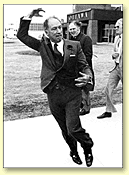
 |
 |
 |
 |

|
Franšais |
||
Article 2 by Bob Rae
- Regional Splits
Canada is a federation. This may seem an exceedingly boring and obvious statement. But like many truisms it is true. Canada cannot be understood as a unitary state, or as a country that can be run from the centre.
Canada's first separatist was not from Quebec, but from Nova Scotia. Joseph Howe's pulverizing election victory over Charles Tupper in 1868 was a referendum on a single issue, confederation. He spent the first year of his administration petitioning the British Colonial Secretary in London to let Nova Scotia out of the 1867 deal. His request was refused in no uncertain terms:
"Vast obligations, political and commercial, have already been contracted on the faith of a measure so long discussed and so solemnly adopted ... the Queen's government feel that they would not be warranted in advising the reversal of a great measure of state, attended by so many extensive consequences already in operation."
Howe accepted the decision. But this did not end Nova Scotian frustration that the Atlantic provinces' economic fortunes became increasingly tied to those of central Canada as a result of the National Policy. Whether a different arrangement would have changed the pattern of economic development in the Maritimes is a matter of deep disagreement. What is important is that feelings of regional resentment against the centre were embedded in Canada from the very beginning. This has given Canada a stronger federal tradition, but often with a sense of local and parochial "me first", which hasn't always been healthy.
While Howe was fighting his losing battle in Nova Scotia, Louis
Riel was attempting to establish a distinct society on the banks
of the Red River to the west. Once again, the Macdonald administration,
which had as profound a centralizing bent as any in Canadian history
until the advent of Pierre Elliott Trudeau, went to great lengths
to assert federal power and discipline. The conflict eventually
led to the Red River Rebellion and Riel's death at the hands of
an executioner. Macdonald's decision to hang Riel had more than
one fateful result. Quebec was incensed.
Laurier was empowered. The Tories were long associated with more
than just racial intolerance: In the public mind, they also became
linked with the use of central power to enforce regional conformity
and Ottawa's supremacy.
In the years that followed, the immigrant families who came west, both from central Canada and from Europe, quickly created provinces with a culture different from "the East". It was, as Barry Cooper pointed out last week, more egalitarian, less deferential, and ultimately more politically radical than anything seen at the centre. The Conservative victory over Sir Wilfrid Laurier in 1911 confirmed high tariffs on imported manufacturing, giving permanent fuel to the Western farmers' sense that they were subsidizing the industrialists of Ontario and Quebec and being denied free and fair access to the lucrative American market. Western political radicalism was born of this sense of unfairness. It fuelled the Winnipeg General Strike of 1919 and the election of dozens of Progessive M.P.s from the prairies in the election of 1921.
The growing regional conflicts with the feds were partly about money and resources, but also about values and principles. Alberta's Aberhart and Manning quarrelled with Ottawa about the regulation of the press; Saskatchewan's Tommy Douglas about the insurance industry and health care. Their political popularity stemmed largely from their willingness to stand up to the eastern Fat Cats and Bureaucrats.
The last thirty years have only seen a deepening of these historic tensions. Mythology would have it that Mr. Diefenbaker's triumphant election in 1958 was cut short by a conspiracy of the Eastern establishment. Like Joe Clark's short-lived victory twenty years later, a more objective view might see it more as a case of suicide than manslaughter. But the myth was fuelled.
In the 1960s, the Pearson administration's preoccupation with the partnership between English and French also received short shrift in the West. Alberta's premier, Ernest Manning, sent Mr. Pearson a sharp letter on the formation of the Royal Commission on Bilingualism and Biculturalism in which he made it clear that the Commission did not reflect his vision of the country.
But no administration galvanized Western opinion as sharply as Mr. Trudeau's. Not only was he seen as mesmerized by Quebec's political agenda, his views on resource management, energy pricing, and constitutional change guaranteed opposition victories across the West, just as surely as Macdonald's decision to hang Riel (and Borden's handling of the conscription question during World War I) resulted in the election of Liberals in Quebec for generations.
The final irony is that, in recent years, the advent of free trade and the erosion of the federal government's fiscal strength have fuelled regional resentment at the centre, in Ontario itself. Dean Acheson once said of Great Britain that it had lost an empire and was looking for a role. The same might now be said for Ontario. With the abandonment of the National Energy Programme, the signing of free trade and the NAFTA, and the decision to discriminate against Ontario in fiscal transfers, Ottawa created an inevitable dynamic: those who are treated as regions will react in a regional fashion.
Yet the centre needs a continuing capacity to act for the whole country. The persistence of regional resentments from one corner of Canada to another is the least attractive feature of our national character. There is no avoiding them: the challenge is to put them in perspective. As the great Canadian radical William Lyon Mackenzie put it best:
"This then is politics. That part of our duty which teaches us to study the welfare of our whole country, and not to rest satisfied altho' our own household is well off when our neighbours are in difficulty and danger. The honest politician is he who gives all he can and means to promote the public good, whose charity begins at home but does not end there. The man who says he is no politician is either ignorant of what he is saying or a contemptible selfish creature, unworthy of the country or community of which he is a part."
There has been much ink spilt by digruntled "regional" parties, from Joseph Howe to Preston Manning, about the unfairness of the principle of majority rule. Having denounced "central Canada" for a generation, Mr. Manning should hardly be surprised that Reform has yet to be embraced by Ontario. Federalism is about balance. If the centre cannot hold at all, the country will not make it as a federation. And a federation it must be.
|
||

